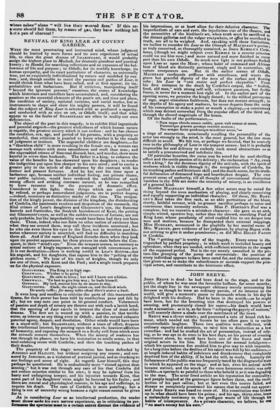JOHN REEVE.
JOHN REEVE is dead : he had been dead to the stage, and to the public, of whom he was once the favourite buffoon, for some months; yet the single line in the newspaper obituary merely announcing his decease as though he were an ordinary person, of no interest to the world, will give a moment's pause to thousands whom in his day be delighted with his drollery. Had he been in the zenith—as he might have been, but for the besetting vice that destroyed his powers of amusing, and prematurely closed his career—his death would have made a sensation : as it is, so far from "eclipsing the gayety of nations," it will scarcely throw a shade over the merriment of the town.
REEVE was a clever mimic; and possessed a vein of broad rich hu- mour, which needed not the licence be too often gave it to excite uncontrollable laughter. These two qualities were sufficient, witk ordinary capacity and attention, to raise him to distinction as a low comedian : and bad he studied the art of personation, instead of rely- . ing, as he was apt to do even in his best days, on his power of creating merriment alone, be would have been one of the finest and most original actors in his line. But fondness for sensual indulgence— which his spontaneous fun enabled him to give way to with impunity, for u long time before the decline of his talent was felt by his audience,— at length induced habits of indolence and drunkenness that completely deprived him of the ability, if he had the will, to study. Latterly the forbearance of the public was too frequently taxed by the disgraceful state in which he appeared on the stage : and at last, even his animal mirth became extinct, and the wreck of the once humorous mimic was only visible—a spectacle as painful to those who beheld it as it was degrading to the man. The actor lived awhile on his reputation for comicality; and people laughed at the grotesque figure before them, and the recol- lection of his past sallies; but at last even this source failed, and disease so completely prostrated his nature that he could not appear; and JOHN Reeve was beard no more of. His constitution was broke* up in what should have been his prime ; and his age, thirty-nine, bears a melancholy testimony to the profligate waste of life through bis habits of intemperance. As a private character, we believe, be wM "no man's enemy but his own."


























 Previous page
Previous page